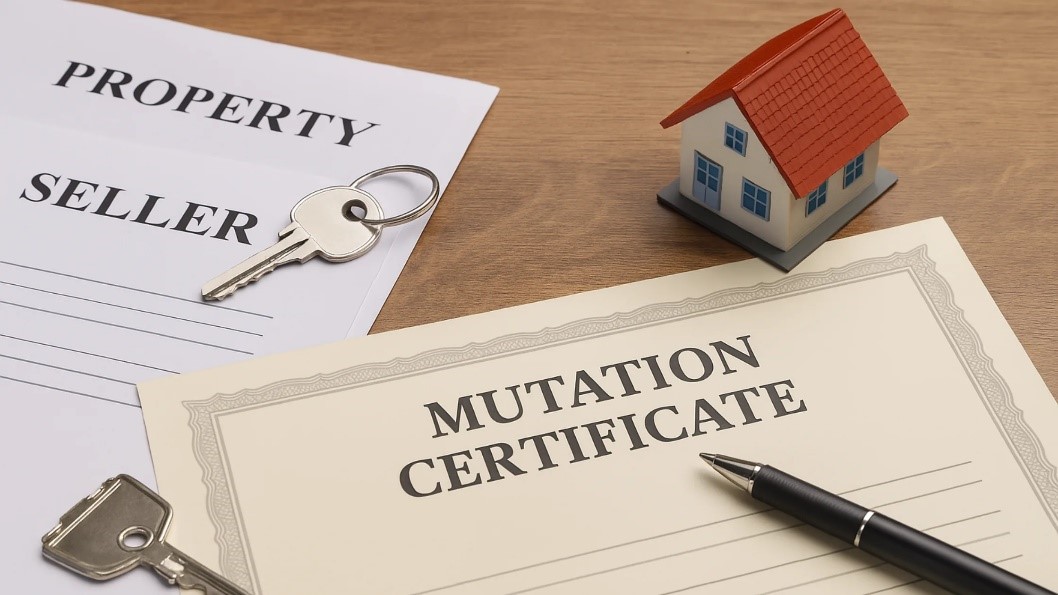When buying a property—whether a flat or a piece of land—two legal processes stand out as essential: registration and mutation. While both are vital to establishing your rights over a property, many homebuyers often confuse the two or overlook one entirely, which can lead to major legal and financial complications in the future. This detailed guide aims to simplify the technicalities surrounding registration and mutation, explain their differences, and help you navigate them with complete confidence.
What Is Property Registration and Why Is It Important?

Property registration is the process of legally recording the ownership transfer from the seller to the buyer. It’s governed by the Registration Act, 1908, and conducted through the Sub-Registrar’s office in your jurisdiction.
During registration, the property sale deed is stamped and documented in government records, confirming the buyer as the lawful owner. Without registration, the transaction holds no legal validity, and ownership cannot be claimed in court.
Registration ensures:
- Legal proof of ownership
- Transparency in property transactions
- Prevention of fraud and illegal transfers
- A clear chain of title
The registered sale deed acts as the legal evidence of ownership, recognized by courts, financial institutions, and municipal authorities.
What Is Property Mutation and Why Does It Matter?

Property mutation refers to the process of updating the ownership details in the local municipal or revenue records after the sale deed is registered. While registration validates ownership legally, mutation updates the government’s land or property records to reflect the new owner’s name.
In simple terms, registration gives you legal ownership, and mutation gives you administrative ownership. It ensures that future property tax bills, utility records, and municipal communications reach the correct owner.
What Is the Difference Between Property Registration and Mutation?
Understanding the distinction between these two processes is crucial for every property buyer.
| Aspect |
Registration |
Mutation |
| Purpose |
Legal transfer of ownership |
Updating ownership in government records |
| Authority |
Sub-Registrar Office |
Municipal or Revenue Department |
| Legal Requirement |
Mandatory |
Recommended but essential for taxes and resale |
| Proof of Ownership |
Yes, legal proof |
Administrative record only |
| Document Issued |
Registered Sale Deed |
Mutation Certificate or Extract |
| Timing |
Immediately after sale agreement |
After registration is completed |
| Fees |
Stamp duty + registration charges |
Nominal mutation fee |
Is Mutation Required After Property Registration in India?
Yes. After property registration, mutation becomes the next logical step. Although it’s not mandatory in all states, it’s highly recommended because mutation updates ownership details in government land records.
Failure to complete mutation can cause issues when paying property tax, applying for utilities, or reselling the property. It also helps establish a traceable record in local municipal and revenue databases.
Can Mutation Be Done Without Registration of Property?
No, mutation cannot be done without prior registration. The sale deed is the primary document establishing ownership, and without it, mutation authorities will reject your application.
However, in cases of inheritance or gift, mutation can be initiated based on succession certificates, wills, or gift deeds, even without a formal sale deed.
Does Property Mutation Prove Ownership or Legal Title?

No, property mutation alone does not prove legal ownership. It only serves as evidence that the government records reflect your name as the occupier or taxpayer.
Legal ownership is established through the registered sale deed. Hence, mutation supports ownership proof but does not replace the legal title conferred by registration.
What Documents Are Needed for Mutation After Registration?

The list of required documents may vary slightly by state, but generally, you’ll need:
- Copy of the registered sale deed
- Latest property tax receipts
- Identity and address proof of the new owner
- Application form for mutation
- Affidavit and indemnity bond
- No Objection Certificate (NOC) from housing society, if applicable
These documents help the municipal or revenue officer verify ownership and ensure transparency in records.
How Long Does Property Mutation Take After Sale Deed?

Typically, the property mutation process takes around 15 to 30 working days after submission of all required documents.
However, the duration may vary based on the state, city, and efficiency of the municipal office. Some states have enabled online portals that speed up this process significantly.
What Are the Charges for Property Registration vs Mutation Fees?
Registration charges are substantially higher than mutation fees.
- Registration Charges: Usually 1% of the property’s value.
- Stamp Duty: 5% to 7% of the property value depending on the state.
- Mutation Fees: Generally nominal, ranging between ₹25 to ₹200, though it can be slightly higher in metropolitan areas.
These charges must be paid to complete both legal and administrative ownership formalities.
Can I Sell Property Without Doing Mutation First?
Technically, yes—you can sell a registered property even if mutation hasn’t been done. However, it’s strongly discouraged.
Without mutation, the municipal records still reflect the previous owner’s name, causing confusion in property taxes and future ownership claims. It may also raise red flags during due diligence by buyers or banks.
Is Mutation Mandatory for Apartments or Only for Land?

Mutation is essential for both—apartments and land.
For apartments, mutation updates ownership in the municipal property tax records, ensuring that future bills are issued to the rightful owner. For land, it’s crucial in revenue records to establish lawful possession.
How to Check Mutation Status Online in My State?
Most states in India now offer online mutation tracking systems through their municipal or revenue department websites.
You can visit your state’s official property portal, enter your property details or mutation application number, and check the current status of your request in real-time.
Which Department Handles Mutation: Municipal vs Revenue Records?
For urban properties (flats, apartments, or houses within city limits), mutation is handled by the Municipal Corporation.
For agricultural or rural land, the Revenue Department or local Tehsildar office manages mutation. This distinction is key to applying at the correct authority.
Is Mutation Needed for Inherited Property or Gift Deeds?

Yes, mutation is equally important for properties acquired through inheritance or gift.
In such cases, ownership transfers without a sale deed, so mutation acts as the official record update, reflecting the change in ownership due to succession or gifting.
What Happens If Mutation Is Not Done After Registration?
If mutation is not done, the property continues to appear under the previous owner’s name in government records.
This can lead to difficulties in paying property tax, securing bank loans, or selling the property later. It may even cause disputes during legal verification.
When Should I Apply for Mutation After Registration?
It’s advisable to apply for mutation immediately after the sale deed registration, ideally within 30 days.
Early application ensures your name is reflected in municipal and revenue databases quickly, avoiding complications or penalties.
Does Bank Home Loan Approval Require Mutation Certificate?
Most banks primarily require the registered sale deed for loan processing.
However, a mutation certificate can add credibility to your application, showing that the property records are updated in your name, especially in resale or inherited cases.
Registration vs Mutation: Common Mistakes and How to Avoid Them
- Skipping Mutation Entirely: Many buyers stop after registration, unaware that mutation is equally vital. Always complete both steps.
- Delaying the Process: Postponing mutation can complicate future ownership proof.
- Incorrect Documents: Ensure all supporting documents are accurate and match the registered details.
- Ignoring Local Authority Differences: Check whether your area’s mutation is handled by municipal or revenue records.
- Not Checking Mutation Status: Always verify online or through physical records to ensure successful mutation entry.
By avoiding these mistakes, you can secure your property rights smoothly.
Conclusion
Registration and mutation together create the complete legal and administrative framework of property ownership in India. While registration confirms legal title, mutation ensures that government records recognize you as the rightful owner for taxation and administrative purposes.
Whether you own a flat in a metropolitan city or a plot of land in a semi-urban area, completing both steps ensures peace of mind and a clear ownership trail for future generations.
At Housiey, we aim to simplify your property journey by connecting you directly with verified builders—without sharing your contact details with multiple brokers. Our goal is to make your home-buying experience transparent, secure, and hassle-free.
To stay informed about the latest infrastructure developments that impact property values, don’t miss our insightful blog on the Shaktipeeth Expressway.
FAQs
When buying a property—whether a flat or a piece of land—two legal processes stand out as essential: registration and mutation. While both are vital to establishing your rights over a property, many homebuyers often confuse the two or overlook one entirely, which can lead to major legal and financial complications in the future. This detailed guide aims to simplify the technicalities surrounding registration and mutation, explain their differences, and help you navigate them with complete confidence.
What Is Property Registration and Why Is It Important?

Property registration is the process of legally recording the ownership transfer from the seller to the buyer. It’s governed by the Registration Act, 1908, and conducted through the Sub-Registrar’s office in your jurisdiction.
During registration, the property sale deed is stamped and documented in government records, confirming the buyer as the lawful owner. Without registration, the transaction holds no legal validity, and ownership cannot be claimed in court.
Registration ensures:
- Legal proof of ownership
- Transparency in property transactions
- Prevention of fraud and illegal transfers
- A clear chain of title
The registered sale deed acts as the legal evidence of ownership, recognized by courts, financial institutions, and municipal authorities.
What Is Property Mutation and Why Does It Matter?

Property mutation refers to the process of updating the ownership details in the local municipal or revenue records after the sale deed is registered. While registration validates ownership legally, mutation updates the government’s land or property records to reflect the new owner’s name.
In simple terms, registration gives you legal ownership, and mutation gives you administrative ownership. It ensures that future property tax bills, utility records, and municipal communications reach the correct owner.
What Is the Difference Between Property Registration and Mutation?
Understanding the distinction between these two processes is crucial for every property buyer.
| Aspect |
Registration |
Mutation |
| Purpose |
Legal transfer of ownership |
Updating ownership in government records |
| Authority |
Sub-Registrar Office |
Municipal or Revenue Department |
| Legal Requirement |
Mandatory |
Recommended but essential for taxes and resale |
| Proof of Ownership |
Yes, legal proof |
Administrative record only |
| Document Issued |
Registered Sale Deed |
Mutation Certificate or Extract |
| Timing |
Immediately after sale agreement |
After registration is completed |
| Fees |
Stamp duty + registration charges |
Nominal mutation fee |
Is Mutation Required After Property Registration in India?
Yes. After property registration, mutation becomes the next logical step. Although it’s not mandatory in all states, it’s highly recommended because mutation updates ownership details in government land records.
Failure to complete mutation can cause issues when paying property tax, applying for utilities, or reselling the property. It also helps establish a traceable record in local municipal and revenue databases.
Can Mutation Be Done Without Registration of Property?
No, mutation cannot be done without prior registration. The sale deed is the primary document establishing ownership, and without it, mutation authorities will reject your application.
However, in cases of inheritance or gift, mutation can be initiated based on succession certificates, wills, or gift deeds, even without a formal sale deed.
Does Property Mutation Prove Ownership or Legal Title?

No, property mutation alone does not prove legal ownership. It only serves as evidence that the government records reflect your name as the occupier or taxpayer.
Legal ownership is established through the registered sale deed. Hence, mutation supports ownership proof but does not replace the legal title conferred by registration.
What Documents Are Needed for Mutation After Registration?

The list of required documents may vary slightly by state, but generally, you’ll need:
- Copy of the registered sale deed
- Latest property tax receipts
- Identity and address proof of the new owner
- Application form for mutation
- Affidavit and indemnity bond
- No Objection Certificate (NOC) from housing society, if applicable
These documents help the municipal or revenue officer verify ownership and ensure transparency in records.
How Long Does Property Mutation Take After Sale Deed?

Typically, the property mutation process takes around 15 to 30 working days after submission of all required documents.
However, the duration may vary based on the state, city, and efficiency of the municipal office. Some states have enabled online portals that speed up this process significantly.
What Are the Charges for Property Registration vs Mutation Fees?
Registration charges are substantially higher than mutation fees.
- Registration Charges: Usually 1% of the property’s value.
- Stamp Duty: 5% to 7% of the property value depending on the state.
- Mutation Fees: Generally nominal, ranging between ₹25 to ₹200, though it can be slightly higher in metropolitan areas.
These charges must be paid to complete both legal and administrative ownership formalities.
Can I Sell Property Without Doing Mutation First?
Technically, yes—you can sell a registered property even if mutation hasn’t been done. However, it’s strongly discouraged.
Without mutation, the municipal records still reflect the previous owner’s name, causing confusion in property taxes and future ownership claims. It may also raise red flags during due diligence by buyers or banks.
Is Mutation Mandatory for Apartments or Only for Land?

Mutation is essential for both—apartments and land.
For apartments, mutation updates ownership in the municipal property tax records, ensuring that future bills are issued to the rightful owner. For land, it’s crucial in revenue records to establish lawful possession.
How to Check Mutation Status Online in My State?
Most states in India now offer online mutation tracking systems through their municipal or revenue department websites.
You can visit your state’s official property portal, enter your property details or mutation application number, and check the current status of your request in real-time.
Which Department Handles Mutation: Municipal vs Revenue Records?
For urban properties (flats, apartments, or houses within city limits), mutation is handled by the Municipal Corporation.
For agricultural or rural land, the Revenue Department or local Tehsildar office manages mutation. This distinction is key to applying at the correct authority.
Is Mutation Needed for Inherited Property or Gift Deeds?

Yes, mutation is equally important for properties acquired through inheritance or gift.
In such cases, ownership transfers without a sale deed, so mutation acts as the official record update, reflecting the change in ownership due to succession or gifting.
What Happens If Mutation Is Not Done After Registration?
If mutation is not done, the property continues to appear under the previous owner’s name in government records.
This can lead to difficulties in paying property tax, securing bank loans, or selling the property later. It may even cause disputes during legal verification.
When Should I Apply for Mutation After Registration?
It’s advisable to apply for mutation immediately after the sale deed registration, ideally within 30 days.
Early application ensures your name is reflected in municipal and revenue databases quickly, avoiding complications or penalties.
Does Bank Home Loan Approval Require Mutation Certificate?
Most banks primarily require the registered sale deed for loan processing.
However, a mutation certificate can add credibility to your application, showing that the property records are updated in your name, especially in resale or inherited cases.
Registration vs Mutation: Common Mistakes and How to Avoid Them
- Skipping Mutation Entirely: Many buyers stop after registration, unaware that mutation is equally vital. Always complete both steps.
- Delaying the Process: Postponing mutation can complicate future ownership proof.
- Incorrect Documents: Ensure all supporting documents are accurate and match the registered details.
- Ignoring Local Authority Differences: Check whether your area’s mutation is handled by municipal or revenue records.
- Not Checking Mutation Status: Always verify online or through physical records to ensure successful mutation entry.
By avoiding these mistakes, you can secure your property rights smoothly.
Conclusion
Registration and mutation together create the complete legal and administrative framework of property ownership in India. While registration confirms legal title, mutation ensures that government records recognize you as the rightful owner for taxation and administrative purposes.
Whether you own a flat in a metropolitan city or a plot of land in a semi-urban area, completing both steps ensures peace of mind and a clear ownership trail for future generations.
At Housiey, we aim to simplify your property journey by connecting you directly with verified builders—without sharing your contact details with multiple brokers. Our goal is to make your home-buying experience transparent, secure, and hassle-free.
To stay informed about the latest infrastructure developments that impact property values, don’t miss our insightful blog on the Shaktipeeth Expressway.
FAQs














